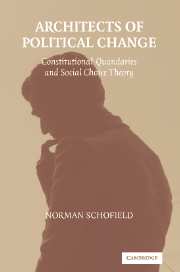Crossref Citations
This Book has been
cited by the following publications. This list is generated based on data provided by Crossref.
Schofield, Norman
2008.
The New Palgrave Dictionary of Economics.
p.
1.
MERRILL, SAMUEL
GROFMAN, BERNARD
and
BRUNELL, THOMAS L.
2008.
Cycles in American National Electoral Politics, 1854–2006: Statistical Evidence and an Explanatory Model.
American Political Science Review,
Vol. 102,
Issue. 1,
p.
1.
Schofield, Norman
2008.
Power, Freedom, and Voting.
p.
259.
Schofield, Norman
and
Zakharov, Alexei
2010.
A stochastic model of the 2007 Russian Duma election.
Public Choice,
Vol. 142,
Issue. 1-2,
p.
177.
Schofield, Norman
2010.
Social orders.
Social Choice and Welfare,
Vol. 34,
Issue. 3,
p.
503.
Pellikaan, Huib
2010.
The Impact of Religion on the Space of Competition: The Dutch Case.
Politics and Religion,
Vol. 3,
Issue. 3,
p.
469.
Gelbman, Shamira M.
and
Rhodes, Jesse H.
2011.
Ideology Construction, Grassroots Mobilization, and Party Strategy in South Africa and the United States, 1934–1948.
Polity,
Vol. 43,
Issue. 2,
p.
154.
Ahlquist, John S.
and
Levi, Margaret
2011.
Leadership: What It Means, What It Does, and What We Want to Know About It.
Annual Review of Political Science,
Vol. 14,
Issue. 1,
p.
1.
Schofield, Norman
and
Caballero, Gonzalo
2011.
Political Economy of Institutions, Democracy and Voting.
p.
1.
Singh, Sourabh
2012.
Unraveling the enigma of Indira Gandhi’s rise in Indian politics: a woman leader’s quest for political legitimacy.
Theory and Society,
Vol. 41,
Issue. 5,
p.
479.
De Neve, Jan-Emmanuel
Mikhaylov, Slava
Dawes, Christopher T.
Christakis, Nicholas A.
and
Fowler, James H.
2012.
Born to Lead? A Twin Design and Genetic Association Study of Leadership Role Occupancy.
SSRN Electronic Journal,
Schnidman, Evan
and
Schofield, Norman
2013.
Power, Voting, and Voting Power: 30 Years After.
p.
187.
Curini, Luigi
and
Pinto, Luca
2013.
Government formation under the shadow of a core party.
Party Politics,
Vol. 19,
Issue. 3,
p.
502.
Schofield, Norman
2013.
Power, Voting, and Voting Power: 30 Years After.
p.
725.
Martin, Adam
and
Thomas, Diana
2013.
Two-tiered political entrepreneurship and the congressional committee system.
Public Choice,
Vol. 154,
Issue. 1-2,
p.
21.
Brewer, Ann M.
2014.
Leadership, Coaching and Followership.
p.
15.
Blake, Charles H.
2014.
The Encyclopedia of Political Thought.
p.
2606.
Rosenthal, Maoz
2014.
Policy Instability in a Comparative Perspective: The Context of Heresthetic.
Political Studies,
Vol. 62,
Issue. 1,
p.
172.
Krehbiel, Jay
and
Ward, Dalston G
2014.
The Logic of Minority Rights.
SSRN Electronic Journal,
Potter, Joshua D.
2014.
Demographic Diversity and District-Level Party Systems.
Comparative Political Studies,
Vol. 47,
Issue. 13,
p.
1801.





